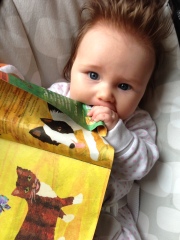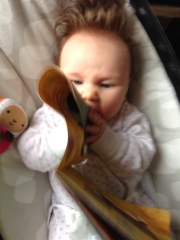If you are ever wondering how people learn best, just take 15 minutes and watch a baby!
You learn by experiencing things.
 I show my 4 and a half month old daughter a new book, she eyes it with curiosity, then she quickly grabs it with her hands and stuffs the corner in her mouth. She proceeds to lick and chew on it, with a funny look on her face, as if to say “this doesn’t taste like I thought it would”, but continues to lick, just to make sure. Thank goodness it is made out of that indestructible paper (think new Canadian money sans all the germs!). As she continues to explore with her senses, I start telling a story with the pictures, pointing at the animals as I describe them and imitating their sounds and gestures. You can tell that she is interested in what I am saying and pointing at, even if she doesn’t understand it yet, because every once and a while she will look up from her slobbery chew fest and stare at the picture I am pointing at, then up at me, then back to the picture, then up at me, then back to chewing. After a quick rendition of E-I-E-I-O, she treats me with a big toothless grin and blows some bubbles — she must have liked my version of a cow’s “Mooooooooo”! Then she shoves the book in her eye. Luckily, she quickly decides that she much prefers “reading” using her mouth, even if it is just by licking the book for right now.
I show my 4 and a half month old daughter a new book, she eyes it with curiosity, then she quickly grabs it with her hands and stuffs the corner in her mouth. She proceeds to lick and chew on it, with a funny look on her face, as if to say “this doesn’t taste like I thought it would”, but continues to lick, just to make sure. Thank goodness it is made out of that indestructible paper (think new Canadian money sans all the germs!). As she continues to explore with her senses, I start telling a story with the pictures, pointing at the animals as I describe them and imitating their sounds and gestures. You can tell that she is interested in what I am saying and pointing at, even if she doesn’t understand it yet, because every once and a while she will look up from her slobbery chew fest and stare at the picture I am pointing at, then up at me, then back to the picture, then up at me, then back to chewing. After a quick rendition of E-I-E-I-O, she treats me with a big toothless grin and blows some bubbles — she must have liked my version of a cow’s “Mooooooooo”! Then she shoves the book in her eye. Luckily, she quickly decides that she much prefers “reading” using her mouth, even if it is just by licking the book for right now.
 My daughter is learning about books… and reading… and social interaction… and the world. She is learning by experiencing, with every sense, every lick, every smile. Can you imagine I tried to teach her about all of that, by standing up in front of her for an hour and telling her about it.
My daughter is learning about books… and reading… and social interaction… and the world. She is learning by experiencing, with every sense, every lick, every smile. Can you imagine I tried to teach her about all of that, by standing up in front of her for an hour and telling her about it.
Mya, this is a book and it is really great because there are all these words and you can read them… no not right now, you are learning right now. Anyway, as I was saying…
I am pretty sure she would turn her attention towards the lamp if that were the case. So why do we expect kids to learn by telling them about things? Yes, a certain amount of background information is helpful, and yes, talking is a part of teaching, but how we talk, and why we talk, needs to be analyzed a little bit. Are we adding to their experience? Or taking away from it?
I think back to a grade 8 Social Studies classes where I was droning on about Edo Japan… watching as the eyes of my students glazed over. Was I really teaching at that moment? Nope. After that class, I decided the students would be better served by experiencing Edo Japan. While I wish I could have loaded them on to a jet plane for an international field trip, I did the next best thing on a budget of $0.oo. I gave them a list of the things they were supposed to “know” or be able to “do” by the end of the unit (“I can” objectives) and I told them they needed to research Edo Japan and find something they found interesting. They needed to find out everything they could about that topic and make it come alive in the classroom, as they would be letting other students experience it. As a teacher, I became a facilitator and supported the students in finding the information and materials they needed to learn and create. I talked, not at them, but with them. At the end of the unit, instead of having a class full of apathetic zombie junior high students and 30 tests to mark, I had a papier mâché panda (almost… it moulded a little in the cupboard, a lesson in and of it self), complete with a bamboo backdrop. I had a group of samurai, wielding their own hand made wooden swords, which I enjoyed watching, after a sushi tasting and a presentation on the Shogun of the time. I had students who spent time at recess, voluntarily (!!!), finishing certain aspects of their projects. But, most importantly, I had a class of students who experienced Edo Japan, and were able to share their experiences with others (they even invited the grade 1/2’s to check out their work). Now this wasn’t perfect, and it was messy, both literally and figuratively, but I would do it again in a heartbeat.
I am betting that once my daughter reaches junior high (ahhhhh!!!), that she will learn a whole lot more from experiential learning than getting talked at. In fact, she would probably learn more from chewing on her textbook.
As I ponder this, I wonder what we can do as teachers to transform the classroom into a true place of learning, of experiencing, while still supporting and scaffolding students in their learning journey. This is as question I will continue to ask myself as I start planning for next year!